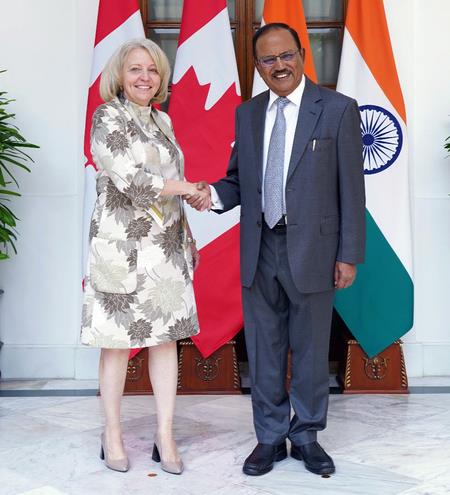India-Canada NSA Talks Signal 'New Normal' In Ties: Report
Sanjay Kumar Verma, former Indian diplomat and the country's former Ambassador to Ottawa, stated that this illustrates the essence of the new normal: incremental, reciprocal, and deliberately modest, aimed at preventing disputes from undermining the wider relationship rather than resolving each one.
"When the National Security Advisors of India and Canada, Ajit Doval and Nathalie Drouin, met in New Delhi on September 18, 2025, the encounter marked something significant: the return of a structured channel to manage differences and anchor cooperation. After two years of rupture, the two sides are no longer trying to restore the past; they are cautiously constructing a new normal, grounded in reciprocity, rules, and operational trust,” Verma, the current Chairperson of the Research and Information System for Developing Countries (RIS), wrote in India Narrative.
“The meeting was presented as part of a standing security dialogue, less a dramatic restart than a methodical re-engagement. For India, the priorities were clear-countering terrorism, defending territorial integrity, safeguarding sovereignty, and fighting transnational organised crime. For Canada, the emphasis was on non-interference, rule of law, sovereignty, and transnational repression,” he added.
The seasoned diplomat emphasised that what emerged was not a grand strategy but a pragmatic alignment, highlighting a shared intent to manage the relationship through principles and mechanisms rather than political theatrics.
According to the report, the arrest of Khalistani extremist Inderjit Singh Gosal in Ontario following the NSA meeting exemplifies this emerging new normal. India had long flagged Gosal as a coordinator for the Khalistani outfit Sikhs for Justice (SFJ) - an organisation formally banned under the Unlawful Activities (Prevention) Act since July 2019, for fomenting secessionism and promoting violence in the name of Khalistan.
"Gosal's detention on firearms charges followed years of Indian complaints about reactive Canadian enforcement. Ottawa's earlier posture under the gaze of the then Prime Minister Justin Trudeau, framed by protections of expression and assembly, had fed perceptions of permissiveness. His September 2025 arrest, however, underscored that without political interference, logical enforcement can proceed within Canada's own legal framework," the report detailed.
“For India, this was a sign that structured engagement can yield results. For Canada, it was an affirmation that such action was consistent with its laws and sovereignty, not a concession to external pressure,” it noted.

Legal Disclaimer:
MENAFN provides the
information “as is” without warranty of any kind. We do not accept
any responsibility or liability for the accuracy, content, images,
videos, licenses, completeness, legality, or reliability of the information
contained in this article. If you have any complaints or copyright
issues related to this article, kindly contact the provider above.
Most popular stories
Market Research

- Zebu Live 2025 Welcomes Coinbase, Solana, And Other Leaders Together For UK's Biggest Web3 Summit
- Yield Basis Nears Mainnet Launch As Curve DAO Votes On Crvusd Proposal
- Blueberry Launches A Bold New Brand Platform
- Stonehaven Circle Marks 13Th Anniversary With Hadrian Colwyn Leading Calvio Ailegacyx Innovation
- R0AR Launches Buyback Vault: Bringing 1R0R To R0AR Chain Unlocks New Incentives
- Moonbirds And Azuki IP Coming To Verse8 As AI-Native Game Platform Integrates With Story





















Comments
No comment